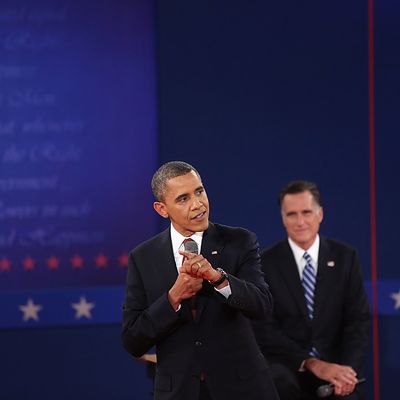
Every week, New York Magazine writer-at-large Frank Rich talks with assistant editor Eric Benson about the biggest stories in politics and culture. This week: Obama’s triumph, Romney’s gaffes, and why neither will prove decisive in the end.
The post-debate consensus seems to be that a different, much stronger Obama came to the debate last night. Two weeks ago you described his performance as Ambien-esque. What changed in his delivery and demeanor?
Everything, really. There wasn’t a single fault in the first debate that he didn’t address. He unapologetically defended his own record. He called out Romney for lying (but politely). His energy level was unflagging. It wasn’t an amphetamine-esque performance, exactly, but it was at least highly caffeinated. Perhaps someday we will learn why Obama kept swinging between these two poles, slacker one night and alpha dog another. This has been his pattern not just in this election year, but in the 2008 campaign and throughout his four years in the White House.
Romney’s performance has been getting lukewarm reviews but hasn’t been totally panned. What did you think of Mitt?
In style, his performance was not all that different from last time — it just looked different next to the recharged Obama. But much more interesting than his performance was a persistent leitmotif of the content: Romney’s many unguarded revelations of how out-of-touch he is with most Americans. He promised that “every middle-income taxpayer no longer will pay any tax on interest, dividends or capital gains” — apparently unaware how little income these three categories yield to most middle-income taxpayers. He continued to harp on his father’s Mexican birth and Ann Romney’s Welsh father to try to pawn his patrician family off as paragons of the immigrant experience. And then there is his utter cluelessness about women. His description of the eureka moment when he discovered that, heavens to Betsy, he had to accomodate female employees balancing jobs and parenting would have been a touching personal revelation if this debate were taking place in the middle of a Mad Men episode, but in 2012 it seemed as archaic as his bizarre insistence of the centrality of coal to America’s economic future. Romney’s account of seeking “binders of women” to staff his administration in Massachusetts has already inspired an avalanche of damning and sometimes brilliant Internet satire (e.g., http://bindersfullofwomen.tumblr.com/). And his behavior toward Candy Crowley often recalled that of the prissy, paternalistic bosses that Gale Gordon used to play in the Lucy sitcoms.
Will Crowley’s fact-check or Obama’s Libya staredown enter the annals of debating lore?
Possibly — especially if Obama ends up winning the election. For starters, the Libya exchange has rendered next Monday’s foreign-affairs debate superfluous. The trumped-up Benghazi scandal was the only card Romney had to play against Obama’s national security record. And now it is dead and buried. Once Obama called him out for his “offensive” exploitation of the tragedy, Romney lost his confidence and never regained it for the rest of the debate. Crowley’s in-real-time fact-check was also impressive — especially in an era when, embarrassingly, fact-checking is no longer an automatic given in journalism but has been split off as a gimmicky addendum. It was also fun to watch Obama encourage Mitt to hang himself on his factual fiasco: That “Please proceed, governor” was priceless. What’s hilarious in the aftermath of Mitt’s mishap is the right’s attempt to defend the error by arguing that Obama had not been talking about “terrorism” when he referred to “acts of terror” in his Rose Garden remarks the day after the Benghazi killings. Does mean that George W. Bush was not fighting terrorism when he declared a “war on terror”?
During the last debate, you said it would be “a non-event except for the junkies and partisans” unless it yielded soundbites. That debate didn’t really produce a “there you go again”–type moment but still seems to have moved the polls. How will this debate affect the campaign narrative?
I was wrong. The debate clearly moved the polls even if it didn’t produce a memorable video bite. (And if it had produced such a moment, it might have been even worse for Obama.) My only defense is that so many others got it wrong as well. After the last debate, some of Obama’s most hysterical cheerleaders in the punditocracy said he might well have lost the election; after this debate, those same fans were heralding his miraculous resurrection. My guess is that the second call is no more accurate than the first. This is a tight race, and tonight did not resolve it.
If opinion holds and most judges rule this one a win for Obama, we’re going to be tied 1–1 in the debates. Does that mean the third will matter a lot? Or have the debates now been neutralized as a decisive factor for either candidate?
My guess is that viewership will be down for the third debate — foreign policy is not where the American Zeitgeist is right now — and it will be a secondary factor in the race, at best.
Okay. So it might not be the Thrilla in Manila. Still, if you’re David Axelrod, what do you do to keep your man sharp?
Tell him only bad news about the campaign. Obama coasts when he gets cocky.
And if you’re Stuart Stevens, what do you do to get Mitt to bounce back?
Do deeper research into the Romney family’s polygamous history in Mexico and pray that at least one of the wives turns out to be an honest-to-God Latina.






























